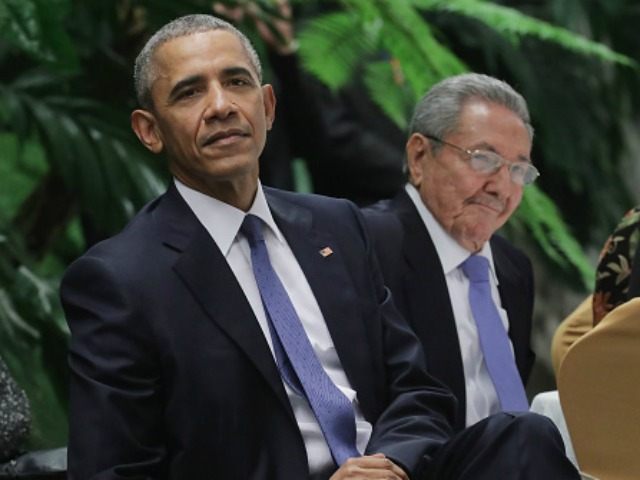President Barack Obama’s decision to shut down the 51-year-old pathway for Cuban immigration into the United States is being praised by his usual enemies, and slammed by his usual friends.
“It is long overdue,” said Mark Krikorian, director of the Center for Immigration Studies, who support the Cuban shutdown. His group wants to reduce the worldwide annual inflow of 2 million legal migrants and contract workers into the United States, who compete for jobs against the four million Americans who turn 18 each year.
“We should never deny a Cuban refugee fleeing a brutal regime entry into the United States,” said a statement from Democratic Sen. Bob Menendez, who worked with Obama in 2013 to pass a law that would have sharply increased legal immigration of foreign workers into the United States.
“Obama’s just scrapped the “wet foot, dry foot” policy,” lamented a tweet from an pro-migration advocate at the Cato Institute. “Terrible move,” added advocate, Alex Nowrasteh, who frequently urges increased migration into the United States, and has backed Obama’s effort to expand immigration.
David Bier, another pro-immigration advocate at Cato also lamented the shut-off.
Matthew Kolken, an immigration lawyer in Buffalo, N.Y., suggested Obama’s shutdown was done for electoral advantage.
The reason for this apparent flip-flop among immigration advocates, however, is that Obama’s immigration policy change is being driven by foreign policy, not by immigration policy.
Since 2014, he has tried to reduce American and international diplomatic and economic sanctions on Cuba’s national-socialist dictatorship.
The decision “grows out of the normalization of relations between our countries,” Obama’s foreign policy spokesman, Ben Rhodes, told reporters Thursday afternoon. The shutdown decision was secretly prepared because “we did not want to speculate publicly about the likelihood of this change for fear of inviting even greater migration flows,” he said.
That move to reduce immigration is a big shift for Obama, who has repeatedly said that Americans don’t have the right to limit foreign migration into the United States. In November, 2014, for example, he declared that:
Sometimes we get attached to our particular tribe, our particular race, our particular religion, and then we start treating other folks differently. And that, sometimes, has been a bottleneck to how we think about immigration. If you look at the history of immigration in this country, each successive wave, there have been periods where the folks who were already here suddenly say, ‘Well, I don’t want those folks’ — even though the only people who have the right to say that are some Native Americans.
Obama’s decision to shut down the path for migrating Cubans “is the obvious corollary of Obama’s normalizing relations with Cuba,” said Krikorian. “This should have been part of the original [2014 U.S-Cuban] deal … but better late than never,” he added.
Krikorian supports the shutdown, partly because Cuban migration has increased the supply of low-wage labor, and so reduced Americans’ wages. The greatest impact was seen in 1980, when a massive movement of Cubans into Miami sharply reduced wages for unskilled Americans, including African-Americans
Menendez — who worked with Obama to pass the 2013 “Comprehensive Immigration Reform” bill that would given work-permits to roughly 33 million foreigners in 10 years — also blamed Obama’s foreign policy for the Cuban migration shutdown.
“The Obama administration seeks to pursue engagement with the Castro regime at the cost of ignoring the present state of torture and oppression, and its systematic curtailment of freedom,” said Menendez.
Some left-wing groups agree with Obama’s decision to favor the Cuban dictatorship over Cuban migrants.
Geoffrey Thale, at the left-wing Washington Office on Latin America, also endorsed the shutdown while also supporting greater immigration from Cuba. “The Obama Administration has taken a positive step toward a more sensible Cuban immigration policy, one that ends preferential treatment for Cubans compared with others who arrive without visas,” said his statement.
Cubans have been seeking entry into the United States primarily because of economic stagnation at home. The U.S. embargo is one of many factors that has contributed to that stagnation, and so WOLA and many colleagues have recommended to the Administration that it should both end preferential treatment for Cubans and increase the number of visas available to Cubans who pursue regular immigration routes.”
Similarly, an author at the American Immigration Council recently promoted a pending bill that would shut down the path. “As our country moves closer to normalizing relations with Cuba, the calls to re-examine our Cuba policy will only continue to grow. Instead of waiting until the last minute to act, Congress should begin looking at this issue now,” the article said.
During Obama’s terms in office, he has allowed a growing inflow of migrants from Central Americans and Cuba.
Since 2012, for example, he allowed more than 350,000 migrants from Guatemala, Honduras and El Salvador to apply for asylum.
Since 2012, more than 100,000 Cubans have also claimed asylum under the 1966 anti0communist law that first set up the Cuban pathway.
According to Pew Research Center, “Overall, 43,159 Cubans entered the U.S. via ports of entry in fiscal year 2015, according to U.S. Customs and Border Protection data obtained through a public records request. This represents a 78% increase over the previous year, when 24,278 Cubans entered. And those 2013 numbers had already increased dramatically after the Cuban government lifted travel restrictions. By comparison, in fiscal 2011, just 7,759 Cubans came into the U.S.”

COMMENTS
Please let us know if you're having issues with commenting.